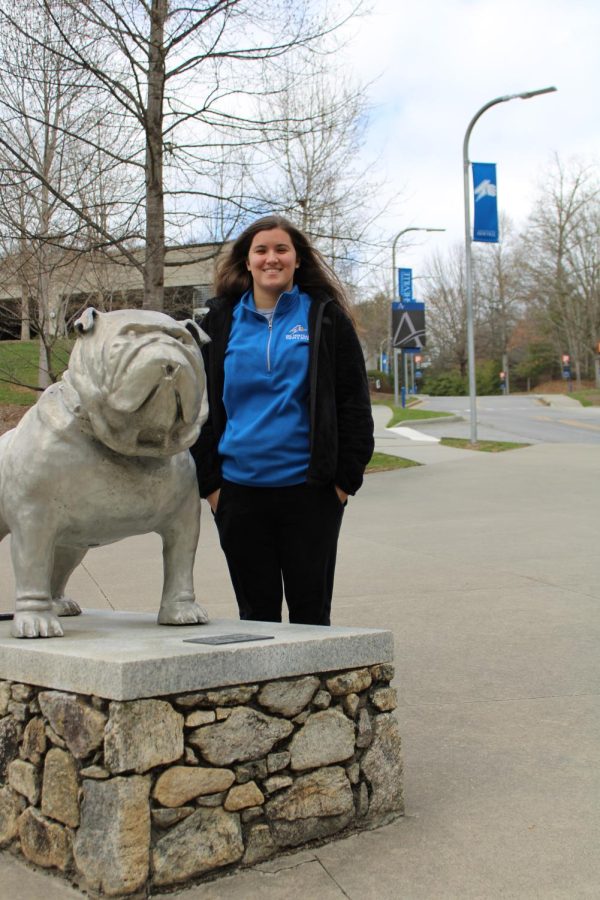Mental health of student athletes remains a balancing act between school and sports
Isabela Vieira next to the bulldog statue outside of the Sherrill Center.
March 19, 2023
For some UNC Asheville student athletes, balancing school and sports might be easy and advantageous to their college life, but others endure more stress and anxiety.
According to Max Weissman, a local psychotherapist in Asheville, playing sports or being active can help moderate stress, improve your overall mood and fight addiction and depression.
“Exercising decreases cortisol levels, which is the hormone that is tied to stress, but exercising also gives us a sacred time for self-care. I believe exercise is extremely helpful for managing stress, managing the pressure of life and also helping our body feel good, which helps our minds feel good,” Weissman said.
Sports can sometimes cause even more stress and depression depending on how participating in these kinds of activities affects you, he said.
“The biggest reason I meet with student athletes is stress and anxiety,” Weissman said. “When a client is under high amounts of stress or anxiety, generally their sleeping decreases, they start eating poorly and they stop exercising as much.”
According to Weissman, familial pressure, relationships, the idea of being stressed and feeling exhausted physically and mentally all contribute to why some student athletes struggle more than others.
Laura Jones, Ph.D., coordinator for mental health services at UNCA, created the “Be Bulldog Brave” program at the school where student athletes, coaches and administrators would be educated, consulted and treated in mental health.
“The mission of the program, and the mission of athletics overall, is to really build, create and support an environment that is both supportive of mental health struggles as well as encouraging individuals to reach out for support when they need it,” Jones said.
For student athletes to have a mental health program, Jones needed to make sure the coaches and administrators were prepared.
“I started creating training sessions for coaches and administrators so they can better understand the mental health needs of athletes,” Jones said. “From my perspective, we can do all the work in the world with the athletes and provide as much education as possible, but if they are going back into a system that doesn’t understand or support those needs, it makes it really difficult to create change.”
While any college student can struggle with mental health issues, Jones discovered rather quickly that student athletes face unique pressure associated with competing in sports.
“For student athletes, their time is extraordinarily limited and they’re constantly having to navigate time pressures,” Jones said. “The pressures are consistent, what those look like and where they come from is always different, but it’s rare to have a student athlete who doesn’t feel pressure in one way or another.”
The program offers Bulldog student athletes options in terms of receiving any kind of mental health care they need, like having individual meetings with athletes and coaches to coordinate mental health care and/or sport psychology services, consultations with coaches on team dynamics or individual athlete concerns and constant mental health assessments of student-athletes.
“Some people might say it’s hard to keep up with assignments and other class work when you have to practice a sport every day, but for me it just made me better at keeping up with my work and staying on top of the schedule,” said Isabela Vieira, a 21-year-old UNCA student and member of the swim team.
She said some student athletes say having friends can make all the difference when it comes to adjusting to college life.
“Especially when coming into college, it might be hard at first to make new connections, but being a part of a sports team automatically gives you a lot of people to connect with and to get to know,” Vieira said.
There are also ways to help student athletes handle the stress of attending college classes and participating in collegiate athletics.
“We have an academic adviser just like the other students, but we also have an assistant athletics director for student athlete success who helps us,” Vieira said. “She is always available to help with balancing school and swimming, and she makes sure we have an appropriate schedule with no conflicts between classes and practice times.”
Stress and anxiety can cause a small number of student athletes to drop out before graduation, but the number of students dropping out gets smaller every year.
According to the National Collegiate Athletic Association, overall Division I student athletes’ graduation rates are at or near their highest-ever levels. From 2018 to 2021, the graduation success rate is 85% for men and 94% for women, for an average of 89% overall.
“About 1-in-4 to 1-in-5 people in the general population will struggle with mental health at some point in their lives, with D1 and elite athletes, that number is closer to 1-in-3,” Jones said.
For UNCA, the average grade-point average for student athletes during the 2021-2022 school year was 3.206, according to the UNCA annual athletics report.
“We are teaching the students that vulnerability is a part of strength and not the antithesis of strength,” Jones said.
The “Be Bulldog Brave” program’s website can be found at https://uncabulldogs.com/sports/2021/11/18/bulldog-mental-health-support-resources.


















